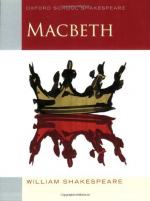|
This section contains 8,827 words (approx. 30 pages at 300 words per page) |

|
SOURCE: Breuer, Horst. “Disintegration of Time in Macbeth's Soliloquy: ‘Tomorrow, and Tomorrow, and Tomorrow.’” Modern Language Review 71, no. 2 (April 1976): 256-71.
In the following essay, Breuer analyzes Macbeth's ‘Tomorrow, and tomorrow, and tomorrow” monologue (Act V, scene v) with reference to the twentieth-century experience of despair and isolation. He proposes that the collapse of time as a symbol of stability and the ensuing disorientation expressed in this soliloquy are paralleled in the works of Samuel Beckett, and that they also reflect Macbeth's attempt to mediate medieval and modern notions of man and his place in the universe.
I
Macbeth's soliloquy in Act V, Scene 5, though one of the most famous of Shakespeare's ‘purple’ passages, still makes difficult reading for most students of the play. The second half of the monologue, beginning ‘Out, out, brief candle’, seems to be less puzzling than the first. Even without a special knowledge of...
|
This section contains 8,827 words (approx. 30 pages at 300 words per page) |

|


